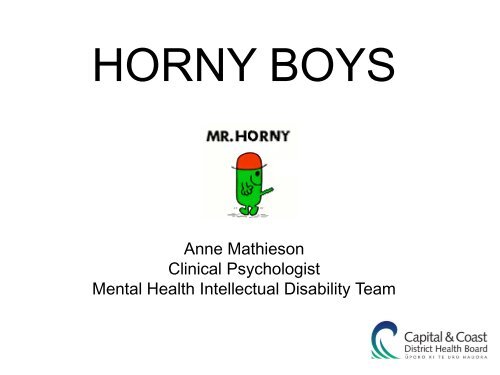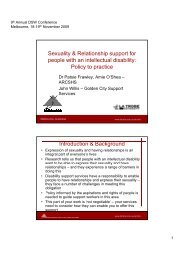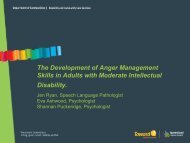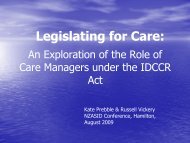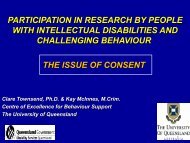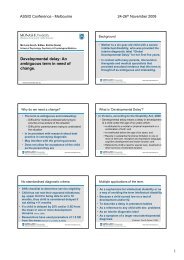HORNY BOYS
HORNY BOYS
HORNY BOYS
Create successful ePaper yourself
Turn your PDF publications into a flip-book with our unique Google optimized e-Paper software.
Where did the idea of thispresentation come from?
Mr Superhero• 22 years old• HCN residential placement• Schooling – special needs unit and Hogben• Work – unpaid in local packing firm• Self reported high sex drive• Daily masturbation• Accesses porn movies• Inserts objects in anus to orgasm quickly• Reports having sex with bath taps and vacuum cleaner• Past hx of sexual play with boy at Hogben• High levels of anxiety• Wants to be normal and have a girlfriend• “It sucks being me”
Concerns ,Thoughts andQuestions• Is there really an issue here?• Are “horny boys” just living in Capital Coast area or arethey found in other parts of NZ?• Is frequent masturbation normal?• What is normal anyway?• Does it mean the person is deviant or a risk to others?• Are we in danger of pathologising what might be part ofnormal adolescent sexual development for young peoplewith intellectual disability?• How do we contribute to the “problem”?
“Normal” masturbation• Kinsey (1948) – 88% of adult males reported havingmasturbated by age 16 years, 95% by age 25 years.• Robbins et al (2010). 73.8% of 14-17yr old malesreported having masturbated. Frequency increased withage.• Gerressu et al (2008). British National Survey ofSexual Attitudes and Lifestyle. 95% of adult malesreported having masturbated at least once in their lives.51.7% reported having masturbated in previous 7 days.Relationship with sexual experience – higherprevalence of masturbation associated with lowerfrequency of sexual occasions.
“Normal” masturbation cont.• Das,Parish & Laumann (2009). Chinese men aged 20-60.Overall prevalence – 45% reported ever having masturbatedYounger men (20-29yrs) – 67% reported ever having masturbatedFrequency -12% several times a week-11% several times a month-35% several times a year-42% neverComparison to US and Finland (prevalence in past year)China US FinlandAmong all men 35% 61% 59%Young men 57% 63% 72%
Closer to home• Smith, Rosenthal & Reichler (1996)Australian adolescent males50% of 15 yr olds had ever masturbated67% of 17 yr olds had ever masturbatedFrequency in previous month39.1% infrequent (never, or 1-2 x month)22.7% occasional (1-2 x week)38.2% frequent (more than 3 x week)• Informal survey of NZ adolescent males (16-20 yrs)Frequency – several times a week. Daily masturbation common.Affected by contextual factors. Frequency reduced with increase insexual experiences with others.
Masturbation in People with• Isler et al (2009)Intellectual Disability55.2% adolescent males with ID reportedever having masturbated.• Lockhart et al (2010)Just over 50% of adults with intellectualdisability reported current masturbation.
So far,so normal?
So why are peoplemaking such a bigfuss?
Frequency of Masturbation• McCabe (1999)Frequency ID PD GPAlmost never44.9%55.3% 36.5%Once a month20.6%12.2% 19.2%Once a week27.1%14.6% 23.1%Daily 12.2% 17.3% 7.5%More than daily 2.4% 3.8% 0
Sexually Inappropriate MasturbationHingsburger (1994) suggests that masturbation is inappropriate if it:• occurs in the wrong time or place• causes injury to the genitalia• is done so frequently that it interferes with regular activities• occurs almost constantlyAdditional criteria could include:• when it causes distress for others (hygiene problems, using objectssuch as stolen underwear, making excessive noise)• When it causes distress for the person (frustration due to inability toreach orgasm, extreme feelings of guilt)
Why?• Why do people withintellectual disability presentwith inappropriatemasturbation?• Why do people withintellectual disability seem toengage in daily masturbation ata greater frequency than in thegeneral population?
Lack of social skillsMedia.ExpectationsMedicationBrain developmentDevianceLack of stimulation/boredomFamily backgroundHormonesLack of socialopportunitiesMental state – stress, anxiety,depressionAttitudes of othersGreater dependence on othersChildhood sexual experienceAnger/FrustrationLack of privacyStigma.Awareness ofdifferenceLimited access tocomprehensivesexuality education
Attitudes of OthersHistorical perspective• Individuals with intellectual disabilitywere considered child-like, asexual andin need of protection. “Holy innocents”or “eternal children”. Or• They were considered to be sexuallythreatening, promiscuous, to haveuncontrollable urges, or to be “oversexed”.
Attitudes cont.“sexual expression is not a problem forpeople with cognitive disabilities – butfor those who work with them”
Attitudes/Responses of ProfessionalsMarshall et al (1999)Therapists can unintentionally obtain information thatfits preconceived beliefs and patients can reportinformation that conforms to expectations that may beunstated – expectations of a treatment culture.
Expectations and Needs• Transition to sex is a developmental process inwhich an individual is abstinent, then goes througha period of becoming “ready” (need for curiosityand exploration related to sex), and then transitionsto a first sexual experience.• Adolescents with intellectual disability have thesame needs and desires as their peers in thegeneral population. They want to be normal. Butseem to be “stuck” at the “ready” stage.• ? Masturbation as a substitute for partnered sex
Education, Skills and Opportunities• Possible lack of access to appropriate sexeducation programmes for young people withintellectual disability.• Social development experiential, and young menwith intellectual disability may have feweropportunities for social interactions than theirtypically developing peers.• Leads to fewer opportunities to learn social skills,social norms and appropriate behaviours.
Family Background• Adolescent development occurs within abroad family and social context• Being brought up in families where sexualboundaries are loose and unclear or wherethey may be victims of sexual abuse mayimpact negatively on an adolescent’sunderstanding of social norms, personalboundaries, and relationships.
Lack of Stimulation• Many adolescents with intellectual disabilitylead narrow lives. Not only are their socialopportunities limited but so are theiremployment and recreational opportunities.• They may not have enough to do and may bebored• ? Masturbation as a response to lack ofexternal stimulation
Mood/Emotions• Social isolation can lead to loneliness• Lack of skills and opportunities can resultin anxiety and depression• Wanting to be normal and being aware ofbeing “different” can lead to anger andfrustration• ? Masturbation as emotional regulation.• Masturbation feels good – self-soothing.
Multiple Functions of Masturbation• Compensation forpartnered sexualexperience• Release sexual tension• Obtain physical pleasure• Relaxation• Get to sleep• Reduce anger• Relieve boredom• Reduce anxiety• Response to lack ofexternal stimulation• Depression• Genital discomfort• Effects of medication• Pain
Lack of social skillsMedia.ExpectationsMedicationBrain developmentDevianceLack of stimulation/boredomFamily backgroundHormonesLack of socialopportunitiesMental state – stress, anxiety,depressionAttitudes of othersGreater dependence on othersChildhood sexual experienceAnger/FrustrationLack of privacyStigma.Awareness ofdifferenceLimited access tocomprehensivesexuality education
Recommendations• Don’t make assumptions• Remember that masturbation (even on a daily basis) isnormal• Investigate – what purpose is this behaviour serving, whyis it occurring?• Target interventions at the underlying factors.• Sexuality education and providing opportunities for sociallearning and appropriate sexual expression should be ahigher priority for service delivery.• RESEARCH!


